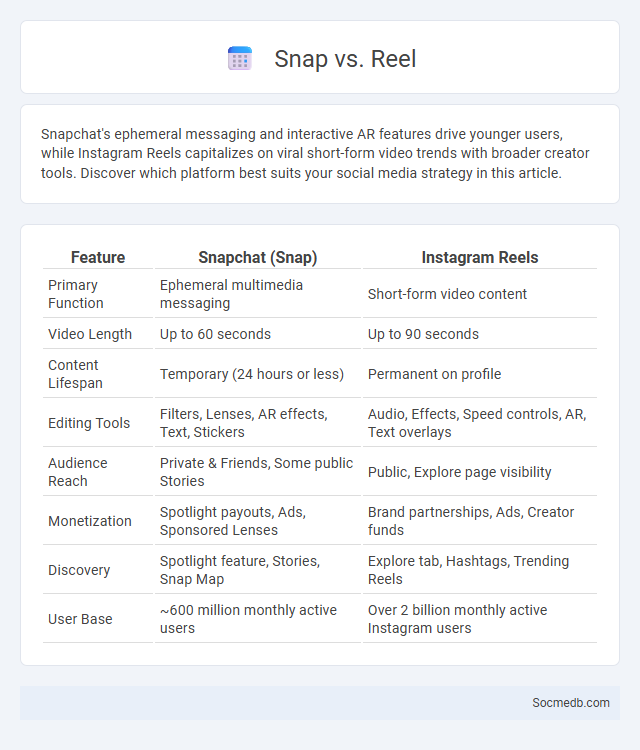
Photo illustration: Snap vs Reel
Snapchat's ephemeral messaging and interactive AR features drive younger users, while Instagram Reels capitalizes on viral short-form video trends with broader creator tools. Discover which platform best suits your social media strategy in this article.
Table of Comparison
| Feature | Snapchat (Snap) | Instagram Reels |
|---|---|---|
| Primary Function | Ephemeral multimedia messaging | Short-form video content |
| Video Length | Up to 60 seconds | Up to 90 seconds |
| Content Lifespan | Temporary (24 hours or less) | Permanent on profile |
| Editing Tools | Filters, Lenses, AR effects, Text, Stickers | Audio, Effects, Speed controls, AR, Text overlays |
| Audience Reach | Private & Friends, Some public Stories | Public, Explore page visibility |
| Monetization | Spotlight payouts, Ads, Sponsored Lenses | Brand partnerships, Ads, Creator funds |
| Discovery | Spotlight feature, Stories, Snap Map | Explore tab, Hashtags, Trending Reels |
| User Base | ~600 million monthly active users | Over 2 billion monthly active Instagram users |
Introduction to Snap, Reel, and Story Features
Snap, Reel, and Story features revolutionize social media by enabling users to share short, engaging content that disappears after 24 hours or stays longer depending on the platform. Snap allows for quick photo and video sharing with playful filters, while Reels focus on creative, music-backed clips designed for discovery on Instagram. Your ability to leverage these tools enhances real-time interaction and boosts visibility through dynamic, ephemeral content formats.
Key Differences Between Snap, Reel, and Story
Snap, Reel, and Story all serve distinct purposes on social media platforms with unique formats and user engagement styles. Snaps are ephemeral messages on Snapchat designed for quick, personal sharing, while Reels on Instagram focus on short, highly-editable videos optimized for viral discovery and broader audience reach. Stories, available on multiple platforms like Instagram and Facebook, emphasize 24-hour temporary content that fosters authentic, sequential storytelling and immediate viewer interaction; understanding these differences helps you maximize your content strategy effectively.
User Engagement: Snap vs Reel vs Story
User engagement on social media varies significantly between Snap, Reel, and Story formats. Reels on Instagram generate higher interaction rates due to their algorithm-driven content discovery and short-form video appeal, attracting extensive likes, shares, and comments. Stories offer ephemeral content that fosters real-time user interaction through polls, questions, and direct messaging, while Snap focuses on intimate, private communication with augmented reality features, resulting in high engagement within close-knit friend circles.
Content Creation Tools Comparison
Content creation tools for social media vary widely in features and user experience, with platforms like Canva offering intuitive drag-and-drop design capabilities, while Adobe Spark provides advanced customization and branding options. Tools such as Hootsuite and Buffer specialize in scheduling and analytics, streamlining post management and performance tracking across multiple channels. Choosing the right content creation tool depends on factors like ease of use, integration with social platforms, and the depth of creative control needed for engaging visual and video content.
Target Audience Analysis
Understanding your target audience on social media involves analyzing demographics, interests, and online behavior to tailor content effectively. By leveraging data analytics tools, you can identify patterns and preferences that drive higher engagement and conversion rates. This targeted approach ensures your social media strategy resonates with your audience, maximizing reach and ROI.
Platform Algorithms and Reach
Platform algorithms determine content visibility by analyzing user behavior, preferences, and engagement patterns to personalize feeds. These algorithms prioritize content that drives interaction, such as likes, shares, and comments, maximizing reach for posts aligned with audience interests. Understanding platform-specific algorithm mechanics enables creators and marketers to optimize posting strategies and enhance organic reach effectively.
Monetization Opportunities
Social media platforms offer diverse monetization opportunities such as sponsored content, affiliate marketing, and direct product sales through integrated e-commerce features. Influencers leverage follower engagement and niche targeting to maximize income streams, while brands use data analytics to optimize ad spend and campaign effectiveness. Emerging trends include subscription-based content models and virtual goods transactions, enhancing revenue potential across platforms like Instagram, TikTok, and YouTube.
Brand Marketing Strategies
Effective brand marketing strategies on social media enhance Your online presence by leveraging targeted content, influencer collaborations, and data-driven audience insights. Consistent visual identity and authentic engagement foster trust and loyalty, while platform-specific campaigns boost reach and conversions. Monitoring analytics enables continuous optimization, ensuring Your brand remains relevant and competitive.
Privacy and Security Considerations
Social media platforms collect vast amounts of personal data, increasing risks of unauthorized access and identity theft. Users should enable strong privacy settings, employ two-factor authentication, and regularly update passwords to protect their information. Awareness of phishing scams and cautious sharing of sensitive content further enhances security on these networks.
Choosing the Right Feature for Your Content
Selecting the ideal social media feature depends on your content type and audience engagement goals. Visual-heavy content thrives on Instagram Stories and Reels, while in-depth discussions perform better on LinkedIn articles or Facebook posts. Prioritize features that maximize visibility and interaction, such as live videos for real-time engagement or carousel posts to showcase multiple products or ideas.
 socmedb.com
socmedb.com